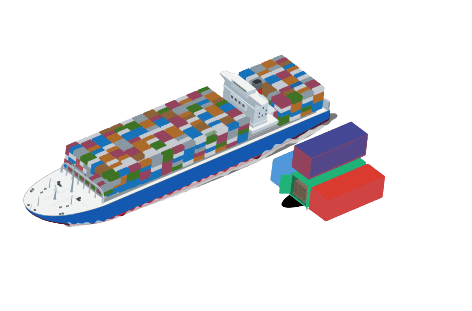To kickstart your company’s export operations, it’s essential to understand the available transportation modes and their key differences. In maritime and air transport, two common options are FCL (Full Container Load) and LCL (Less Container Load). Understanding the characteristics of each mode is crucial to avoid extra costs and ensure efficient operations in international trade.
In this article, we’ll explore the differences between FCL and LCL so you can make the right choice for your company.
What Is FCL?
FCL (Full Container Load) stands for “Full Container Load,” and in this transport model, the company pays a fixed fee for freight, either because it has enough cargo to fill the container or because it wants to transport its goods exclusively, without sharing space with other cargoes.
What is LCL?
On the other hand, in LCL (Less Container Load), the company shares the container with cargoes from different companies. The term “Less Container Load” represents the grouping of goods from various companies into a single container. This mode is ideal for smaller cargo volumes and companies starting in international trade who want to save on transportation costs.
Key Differences Between FCL and LCL
- Delivery Speed: FCL generally provides faster delivery as there’s no need to wait for the container to be filled by other cargoes. In contrast, LCL may have less agile delivery because it depends on other goods to fill the shared container before shipment.
- Demurrage Risk: Demurrage is the fee applied when the container is not returned within the agreed-upon time frame. In the case of FCL, the demurrage risk is higher because the company is responsible for filling the entire container and delivering it on time. In LCL, as sharing reduces waiting time, the demurrage risk is lower.
- Cargo Security: FCL offers greater cargo security since the goods are isolated in the container, and there’s no direct handling by other companies. In LCL, the cargo shares space with other goods, which can increase the risk of damage.
- Recommended for Operation Volumes: FCL is more suitable for companies with a high volume of operations that have enough cargo to fill a container. LCL is better suited for companies with smaller cargo volumes, allowing cost savings in transportation.
How to Choose the Best Transportation Model?
To make the right choice between FCL and LCL, consider the following aspects:
- Calculate the volume and specific value of cargoes for both FCL and LCL. If the goods occupy less than half of the container, LCL freight may be more advantageous.
- Assess the fragility and value of the goods. FCL is suitable for fragile or valuable cargoes as it offers greater security.
- Consider transit time. FCL ensures faster delivery, while LCL may have a longer lead time due to the need to fill the shared container.
Key Costs for FCL and LCL
Regardless of the chosen model, some specific expenses are common in export operations:
- Terminal Handling Charge (THC): In FCL, the fee is determined by the maritime freight company, considering the location and container type. In LCL, the fee is calculated based on the ton per m³ ratio.
- International Security Port Surcharge (ISPS): In LCL, the value is generally quoted according to the B/L (Bill of Lading). In FCL, the value is calculated per container, its load capacity (TEU), or by B/L.
- Delivery Fee: In FCL, it is quoted per container (kilometer or service). In LCL, the quotation is based on the taxable weight.
Which Is the Best Option for You?
The best option for you will depend on the specific needs of your cargo. If you have a large or bulky cargo, FCL is the better choice. If you have a small or medium-sized cargo, LCL is the better option.
Here are some additional factors to consider when choosing between FCL and LCL:
- Your cargo’s volume: If your cargo is large or bulky, FCL is the better choice. If your cargo is small or medium-sized, LCL is the better option.
- The value of your cargo: If your cargo is valuable, FCL is the better choice. If your cargo is not valuable, LCL is the better option.
- Transit time: If you need your cargo to arrive quickly, FCL is the better choice. If you don’t need your cargo to arrive quickly, LCL is the better option.
- Cost: LCL is generally cheaper than FCL, but you need to consider the cost of packing and unpacking your cargo.
In summary, the FCL and LCL modes have advantages and disadvantages, and the choice depends on your company’s specific needs, cargo volume, urgency of delivery, and cargo value. By carefully analyzing these factors, you can make the right decision for an efficient and successful operation in international trade.
What Is Cheap2Ship?
Meet Cheap2Ship, a technology company specializing in logistics and international trade. Through our advanced freight management and quoting platform, medium and large companies have experienced a significant increase in operational efficiency and a reduction in logistics costs.
Our commitment is to provide greater transparency in the costs related to current freight providers, such as shipping lines, freight forwarders, and carriers. With this, our customers can make more informed and strategic decisions for their businesses.
To learn more about our innovative solutions, visit our website and follow us on social media. There, you will find relevant content about international trade, logistics, and supply chain. We are ready to drive your company’s success in the global market. Join us and discover how we can make a difference for your business.

